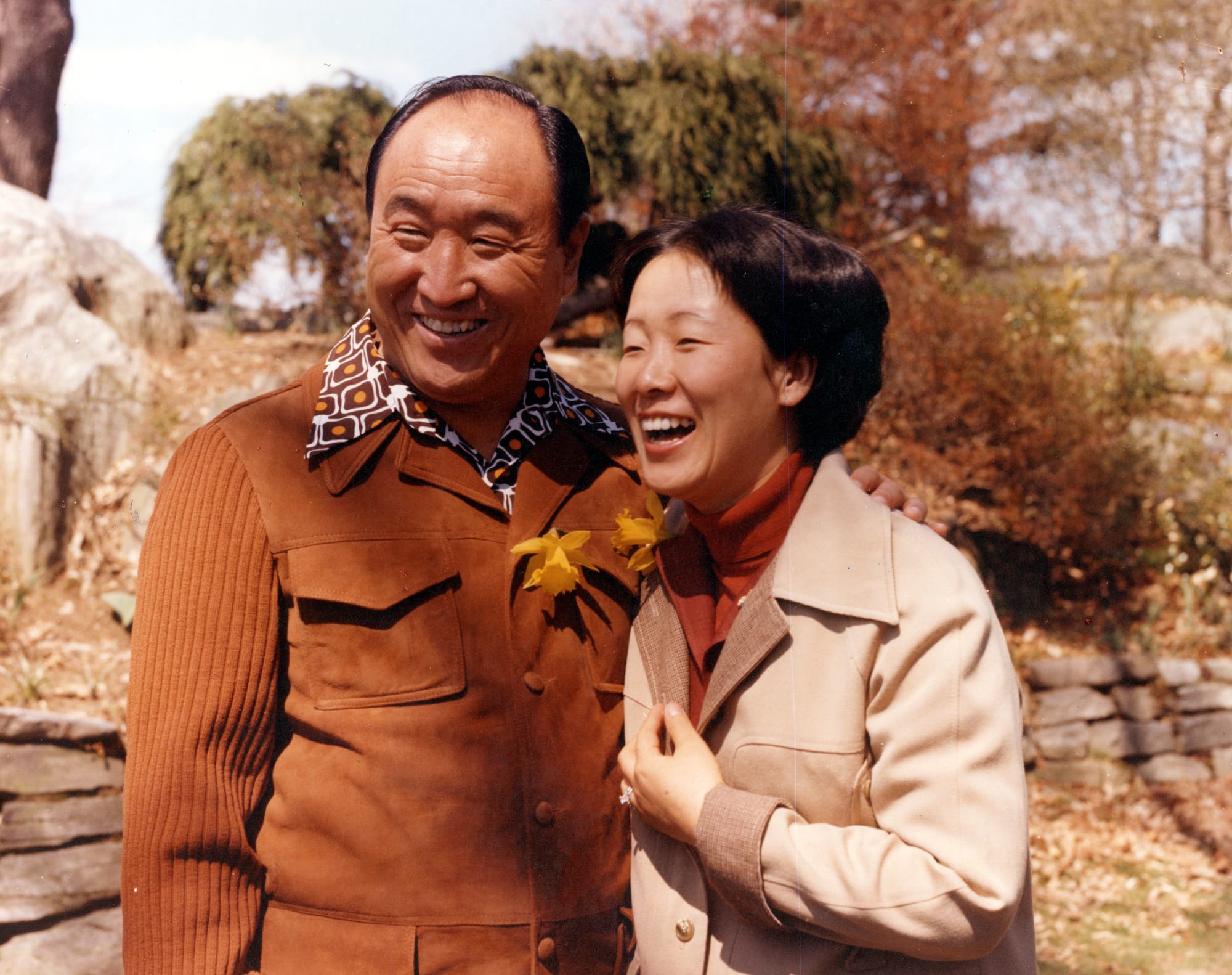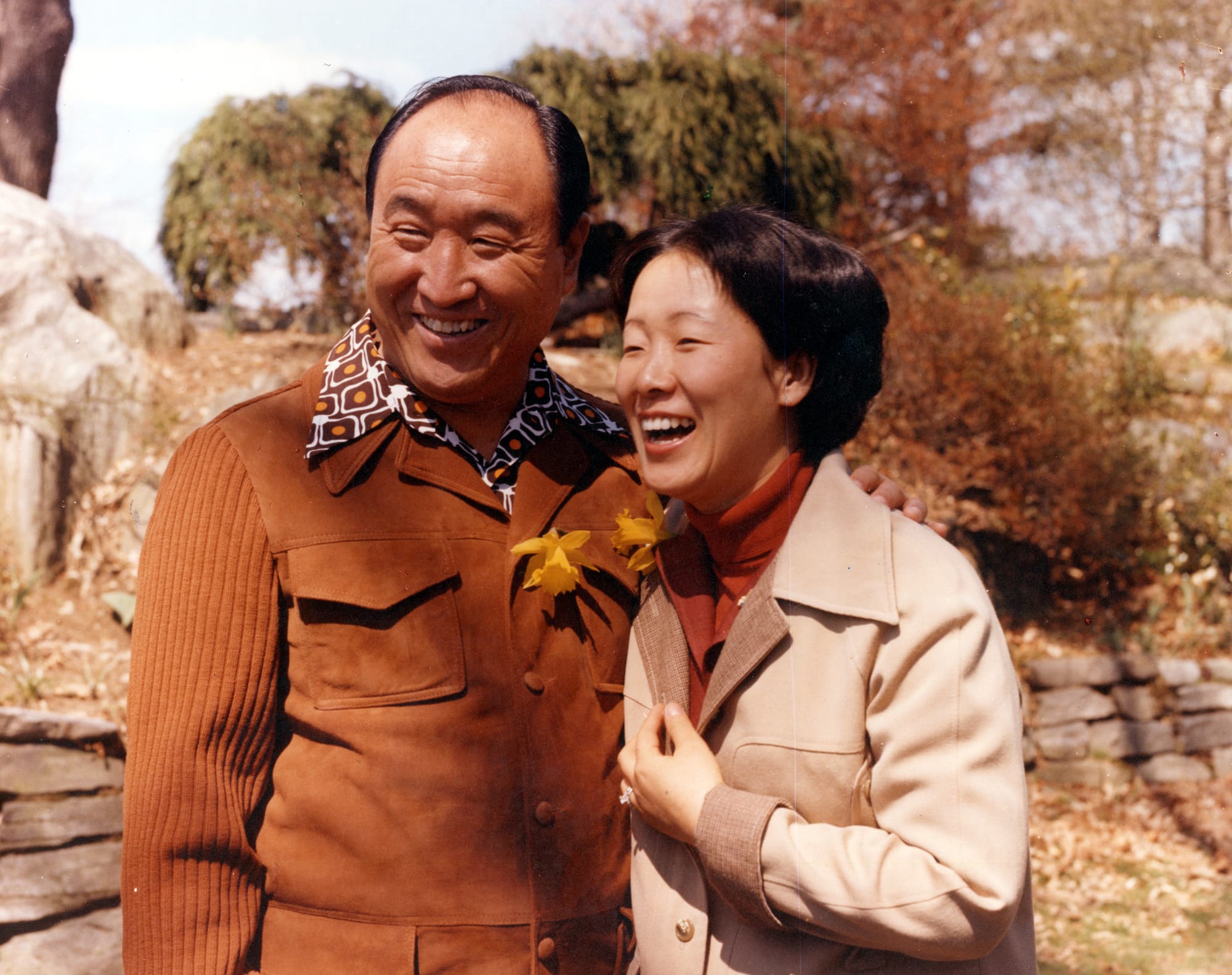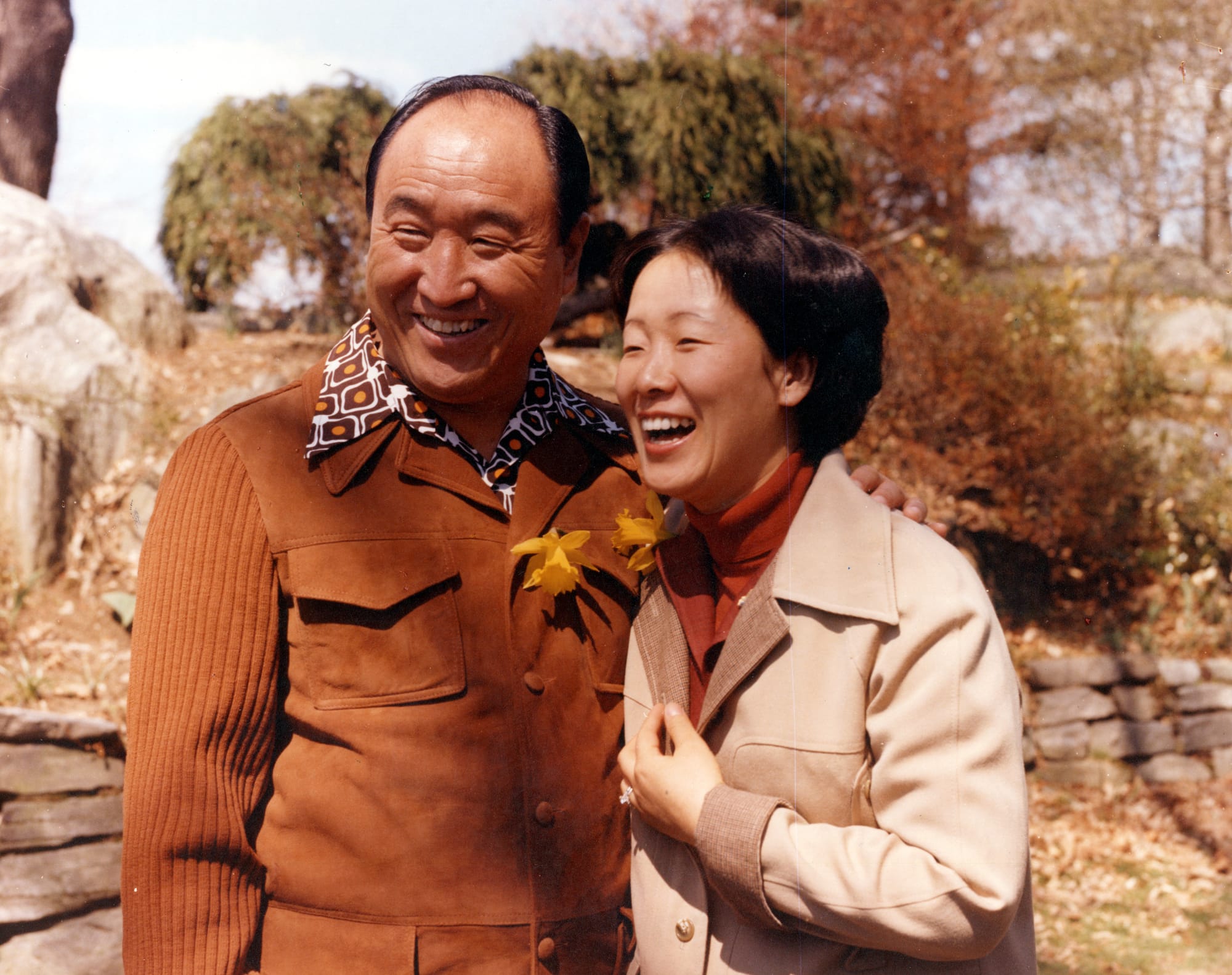Father Moon has the highest respect for Buddhism, a religion that has deeply influenced the culture of his native Korea.
He regards the Buddhist teaching and practice of self-denial as at the summit of world religious teachings for recovering our true original self from the mire of our fallen condition.
To reach that state of emptiness, what Father Moon calls the “zero point,” is true enlightenment.
In Father Moon’s view, Buddhism is lacking two essential points: knowledge of a personal God and full comprehension of the ideal of true love. Nevertheless, it was God who taught the Buddha and set up Buddhism to give light to the Orient.
People of all faiths can learn much from Buddhism, particularly about the way of self-denial to overcome false ego and uncover the true self.

The Values of Buddhism
The best of paths is the Eightfold Path. The best of truths are the Four Noble Truths. Non-attachment is the best of mental states. The best of human beings is the Seeing One. This is the only Way. There is no other that leads to the purity of insight. You should follow this path, for this is what bewilders Mara. Embarking upon that path, you will make an end of pain. I have declared this path after having learned the way for the removal of thorns. Dhammapada 273-75
Not by matted hair, nor by family, nor by birth does one become a Brahmin. But in whom there exist both truth and righteousness, pure is he, a Brahmin is he. I do not call him a Brahmin merely because he is born of a Brahmin womb or sprung from a Brahmin mother. Being with impediments, he should address others as “sir.” But he who is free from impediments, free from clinging—him I call a Brahmin. He who realizes here in this world the destruction of his sorrow, who has laid the burden aside and is emancipated—him I call a Brahmin. He who has laid aside the cudgel in his dealings with beings, whether feeble or strong, who neither harms nor kills—him I call a Brahmin. He who is friendly among the hostile, who is peaceful among the violent, who is unattached among the attached—him I call a Brahmin. In whom lust, hatred, pride, and detraction are fallen off like a mustard seed from the point of a needle—him I call a Brahmin.14 Dhammapada 393, 396, 402, 405-07
Even ornamented royal chariots wear out. So too the body reaches old age. But the Dhamma of the Good grows not old. Thus do the Good reveal it among the Good. Dhammapada 151
What, brethren, is causal happening? “Conditioned by rebirth is decay and death.” Whether, brethren, there be an arising of Tathagatas or whether there be no such arising, this nature of things just stands, this causal status, this causal orderliness, the relatedness of this to that. Samyutta Nikaya 2.25
I pay homage to the Perfection of Wisdom! She is worthy of homage. She is unstained; the entire world cannot stain her. She is a source of light, and from everyone in the triple world she removes darkness, and she leads away from the blinding darkness caused by the defilements and by wrong views. In her we can find shelter. Most excellent are her works. She makes us seek the safety of the wings of Enlightenment. She brings light to the blind; she brings light so that all fear and distress may be forsaken… She is the mother of the Bodhisattvas, on account of the emptiness of her own marks. As the donor of the jewel of all the Buddha-dharmas, she brings about the ten powers [of a Buddha]. She cannot be crushed. She protects the unprotected, with the help of the four grounds of self-confidence. She is the antidote to birth-and-death. She has a clear knowledge of the own-being of all dharmas, for she does not stray away from it. The Perfection of Wisdom of the Buddhas, the Lords, sets in motion the Wheel of the Law. Perfection of Wisdom in Eight Thousand Lines 7.1

Teachings of Sun Myung Moon
In ancient times, Buddhism and Buddhist culture emerged out of God’s will, in order to reform the society of India. Buddhism presented a new ideal through a new understanding of subject and object relationships.15 (144:182, April 24, 1986)
Buddhism, which emerged from India, is a world-level teaching. Only religions like Buddhism, which transcend the practical domain of life and contain a world-level point of view and a transcendental philosophy, will remain in the Last Days. (9:279, June 12, 1960)
Among the Oriental religions, Buddhism is the closest to God’s providence… However, as Buddhism teaches the logic of Sarvadharma [the oneness of all things],16 it is ignorant of a personal God—a major weakness.
Nevertheless, God set things up this way to prepare the people of Asia to one day be united [with God’s Kingdom] through the Oriental religions when Buddhism would connect with Judaism [had the latter received Christ]. (208:311, November 21, 1990)
Buddhism teaches the existence of God, but it focuses on God’s lawful aspect. It does not explain that God is actively working in the world. (53:297, March 4, 1972)
The Buddha’s entire philosophy is based on law (dharma). However, the object of dharma is the circumstances of human beings as objects, not the human being himself.
Actually, the measure of a human being is love, not law. But the Buddha taught a standard based on law; hence his teachings are called Law Sutras.17 Buddhism teaches self-realization, but what should happen after attaining self-realization?
Is that the end of it? That is why, even though Buddhists live solitary lives deep in the mountains and work hard for self-discipline and self-realization, they still are ambiguous about the ideal world of love. (50:116, November 6, 1971)
Buddhist Enlightenment
Strive and cleave the stream. Discard, O Brahmin, sense-desires. Knowing the destruction of conditioned things, be a knower of the Unmade. Dhammapada 383
Since all Dharmas are immanent in our mind there is no reason why we should not realize intuitively the real nature of Suchness. The Bodhisattva Sila Sutra says, “Our Essence of Mind is intrinsically pure, and if we knew our mind and realized what our nature is, all of us would attain Buddhahood.” Sutra of Hui Neng 2
Every Buddha Tathagata is one whose body is the Principle of Nature (Dharmadhatu-kaya), so that he may enter into the mind of any being. Consequently, when you have perceived Buddha, it is indeed that mind of yours that possesses those thirty-two signs of perfection and eighty minor marks of excellence [which you see in Buddha]. In fine, it is your mind that becomes Buddha; nay, your mind is indeed Buddha. The ocean of true and universal knowledge of all the Buddhas derives its source from one’s own mind and thought. Meditation on Buddha Amitayus 17 In heaven and on earth, I alone am the Honored One.18 Digha Nikaya 2.15
Teachings of Sun Myung Moon
When we pray or meditate, as when Buddhists practice Zen, we are seeking a state that is void of self.19 What is our goal in seeking this state? It is to awaken the elements that can become the nucleus of the mind.
If you set that one standard and establish the center of your mind, you will see, hear and cognize everything in accord with the principles of Heaven. Then you can offer a full bow before God and return Him glory. (2:193, May 19, 1957)
Buddhism teaches that one should attain enlightenment and realize one’s self-nature.20 Buddha said, “In heaven and on earth I alone am the honored one.” This means that you reach the state where you know that God exists within you and there is nothing you cannot do.
This is the enlightened mind. Your mind is better than a teacher; your mind is your eternal lord. Therefore, you should not have a selfish mind, but a mind to serve the greater good. (133:179, July 10, 1984)
Shakyamuni in his mystical state, when he could declare, “In heaven and on earth, I alone am the honored one,” is far from the normal thinking of ordinary people. When your committed efforts to reach the state of resonance of mind and body awaken your own self, you will attain the state in which you could say: “I am the best under the sun.” (141:235, February 26, 1986)
Where does God dwell? God is the lord of the “zero point.” That is where God wants to dwell—in the “king zero point.” Since God has such a nature, to meet Him you must become even lower than zero. Then you must guard that king zero point.
The king zero point is like the mind, and as the flesh surrounds the mind, you should surround and protect the zero point. Have you reached the state where you can guard the zero point? It is easy to answer “yes,” but in reality it is not easy.
Mind you, all religions have been seeking to reach God or a position where we can correspond to God. This is what Buddhist meditation is about—to search the God-like mind for the deepest point. (230:134, May 1, 1992)
An Example of Buddhist Wisdom
Subhuti, do not say that the Tathagata conceives the idea: I must set forth a Teaching. For if anyone says that the Tathagata sets forth a Teaching, he really slanders Buddha and is unable to explain what I teach. As to any Truth-declaring system, Truth is undeclarable; so “an enunciation of Truth” is just a name given to it.21 Diamond Sutra 21
What has been realized by the Tathagatas—that is my own realization, in which there is neither decreasing nor increasing; for the realm of self-realization is free from words and discriminations, having nothing to do with dualistic ways of speaking… For this reason it is stated by me that from the night of the Tathagata’s Enlightenment till the night of his entrance into Nirvana, he has not in the meantime uttered, nor ever will utter, one word. Lankavatara Sutra 61
Teachings of Sun Myung Moon
In the Orient, there are many statues of Buddha. Does Buddha’s statue ever say a word? It never speaks a word. It neither praises you nor chastises you; it only thinks.
That is what makes it worthy of worship. Also, its gaze is always focused on one point, never looking around. When we are focused on the Ultimate, what is the point of looking around at trivial matters? It teaches us that the best way to solve the complications of the world is silence. (228:77, March 15, 1992)





